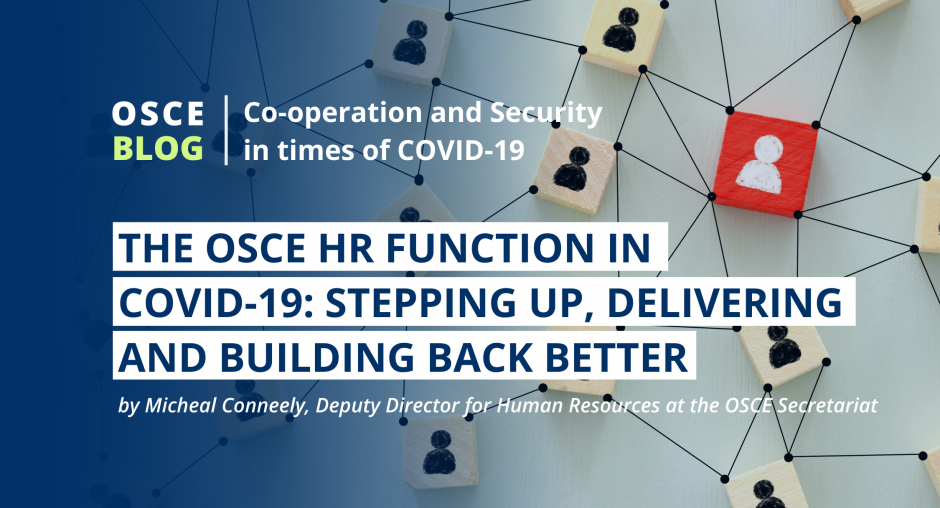The OSCE Human Resources function in COVID-19: Stepping up, delivering and building back better
I read a tongue in cheek commentary on the usefulness of HR some time back that suggested HR were the tonsils of the workplace – most people seem to have them but their purpose is a mystery! However, many of those with a deeper understanding of the potential value of HR often agree on the types of roles that HR should deliver on – a strategic partner to business, an administrative expert, an employee champion and a change agent.
Looking back, it is highly rewarding to see how the HR function across the OSCE has responded in each of the four areas during the crisis. COVID-19 called for decisive HR leadership. A key challenge was how to respond to a very new and serious threat, while at the same time finding creative ways to maintain uninterrupted operations and seize opportunities for the future. It was an unwanted opportunity to be resilient, to be agile and responsive in designing management approaches to fit the circumstances. And, of paramount importance, to ensure that this business continuity did not come at any price.
Prior to COVID-19, duty of care was seen by some as an abstract notion. However, as the primary lens through which the Organization planned and delivered its response, COVID-19 has very much brought duty of care to life. At each stage, risks that threatened health and well-being of staff were addressed. A flexible administrative framework was created, helping to operationalize remote working arrangements across the Organization practically overnight. This was complemented by best practice guides on working remotely, managing remotely and remote gender sensitive management – the adaptation of which by other organizations being testament to the excellence of those in the team who developed them.
Availability of health related services to fit the circumstances was vital. To help staff cope with new work/life challenges, including isolation for some, tailored programmes were delivered. While this new way of working has an impact on everybody, women and those with care responsibilities are disproportionately affected. Tailored resources were created to address these specific challenges.
Internal communication is crucial at any time, but all the more so in times of crisis. With the arrival of COVID-19 bringing information overload externally, providing staff with relevant and reliable information was vital to ease uncertainty. HR teamed up with the Communication and Media Relations Section in carefully crafting key messages for internal audiences, which were delivered by senior leaders through a mix of channels. Recognizing a gap, together the two functions stepped up to initiate COVID-19 related news updates, combining relevant internal and external information and serving as a reliable source for staff.
However, even the dark cloud of COVID-19 offered some silver lining by way of opportunities. Learning lessons, and preserving gains made, are already in focus.
No topic has gained more in terms of shifting traditional mindsets than remote working. Our rallying cry behind remote working has always been that work is something you do, not some place you go. How true this has proved to be in recent months. There are other themes we have sought to progress through this crisis, such as more modern approaches to management – results focused people management, digitalization, business process improvement and promoting flexible learning. As Winston Churchill once said: “never let a good crisis go to waste” - the OSCE HR function is committed to using the current momentum to build back better.

